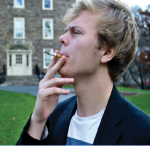Smoking Ban Needs to Be Stopped

On September 24, members of the Student Government Association (SGA) voted to initiate a process to ban smoking on the Colgate campus. I submit that the whole community should be horrified and offended by the very suggestion. The proposed policy shows a wanton disregard for a minority in the community which has not posed a credible threat to campus health or quality of life. Is it the business of SGA to regulate the behavior of students in such a blatant way?
As a community that purports to hold the personal preferences of students in such high regard, how can they seriously say that banning an activity that is neither illegal nor harmful to second parties in any significant way will advance the interests of the school? At any rate, the proposed ban appears not to directly target individuals who smoke, but rather the presence of secondhand smoke. The detrimental effects on the health of the smoker are undeniable, but the proposal will not prevent smoking, it will merely push the behavior off-campus. The school already enforces bans within residences and buildings on campus in compliance with New York State law, based on the dominant logic of secondhand smoke, though even here the link between health effects and secondhand smoke is tenuous at best in my opinion.
The initiative is not definitively aimed at improving the health of smokers or other students. A smoke-free campus is not paternalism; it is nimbyism (not in my backyard – ism). Even if SGA were really concerned about our health, perhaps they should ban alcohol consumption instead. Check out the Campus Blotter to see how many students
seriously and immediately jeopardize their health by consuming alcohol.
If you recoiled at this suggestion, you would do well to realize that it is as ridiculous, as the SGA’s currently proposed ban. Without any legitimate health claims, the only argument in favor of the ban appears to be the fact that some students do not care for the sight or smell of persons consuming tobacco on campus. No other behavior could so frivolously be banned just because of a desire by a few to impose their personal preferences on the student body.
The article written by Nate Lynch, published in the October 31 issue of the Maroon-News,notes that smoking is not widespread, citing the 2012 CORE survey. This is perhaps the most disturbing part of this ill-begotten endeavor; that a behavior undertaken by a low proportion of the community is suddenly appropriate to ban, for no more than an inconsequential affront to others’ senses. The very idea should offend anyone who values personal choice.
Colgate’s President’s suggestion about “self-policing” is also worrying. Since Campus Safety is unwilling to tactlessly police students’ personal choices, the proposal could only work through a citizen watch system that will inevitably put students in the awkward position of confronting their classmates over an activity that is not illegal nor irrefutably harmful to the second party. As if smoking isn’t ostracized enough already, the self-enforced ban would put students at odds with one another for no discernable purpose other than SGA’s dislike for the personal decisions of select students. Another critical problem is that the residential requirement that Colgate strictly enforces would unfairly criminalize a behavior in a student’s compelled residence. Decreeing that a student cannot choose how to conduct their behavior at their own home for eight months is indefensible, not to mention virtually unenforceable. If SGA wishes to codify their dislike of smokers, perhaps they can do so with an alternative method that does not show SGA’s blatant contempt for some students’ personal preferences. They could create covered areas separate from the buildings or strategically placed, designated smoking areas where smokers could be reasonably expected to gather in lieu of the entrances of buildings. They could actually target the detrimental health aspect as well by offering education about nicotine alternatives like patches, electronic cigarettes or nicotine gum through the Campus Health Center. The larger point here is that SGA can take a more nuanced and respectful action rather than immediately opting for this extreme and ultimately futile attempt at a ban.
Contact Derek Judd at [email protected].



